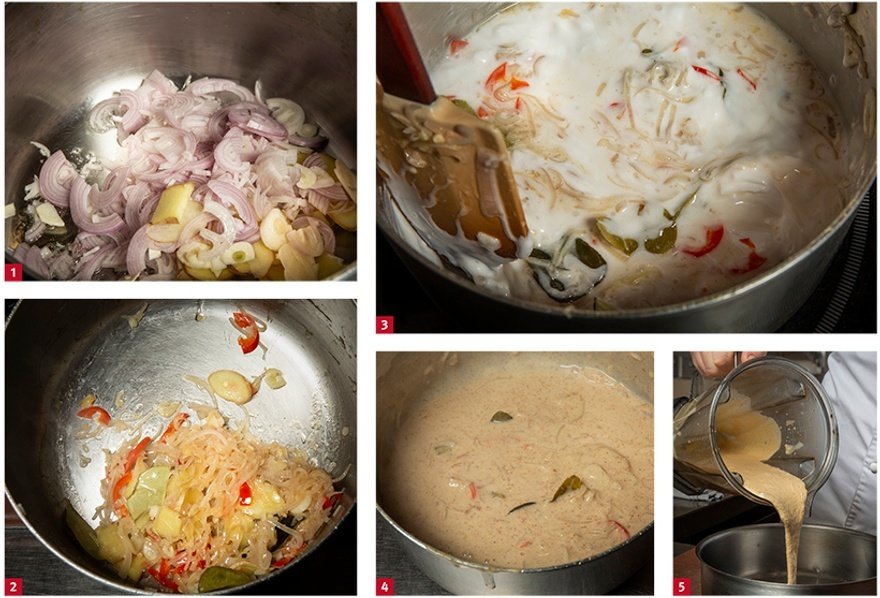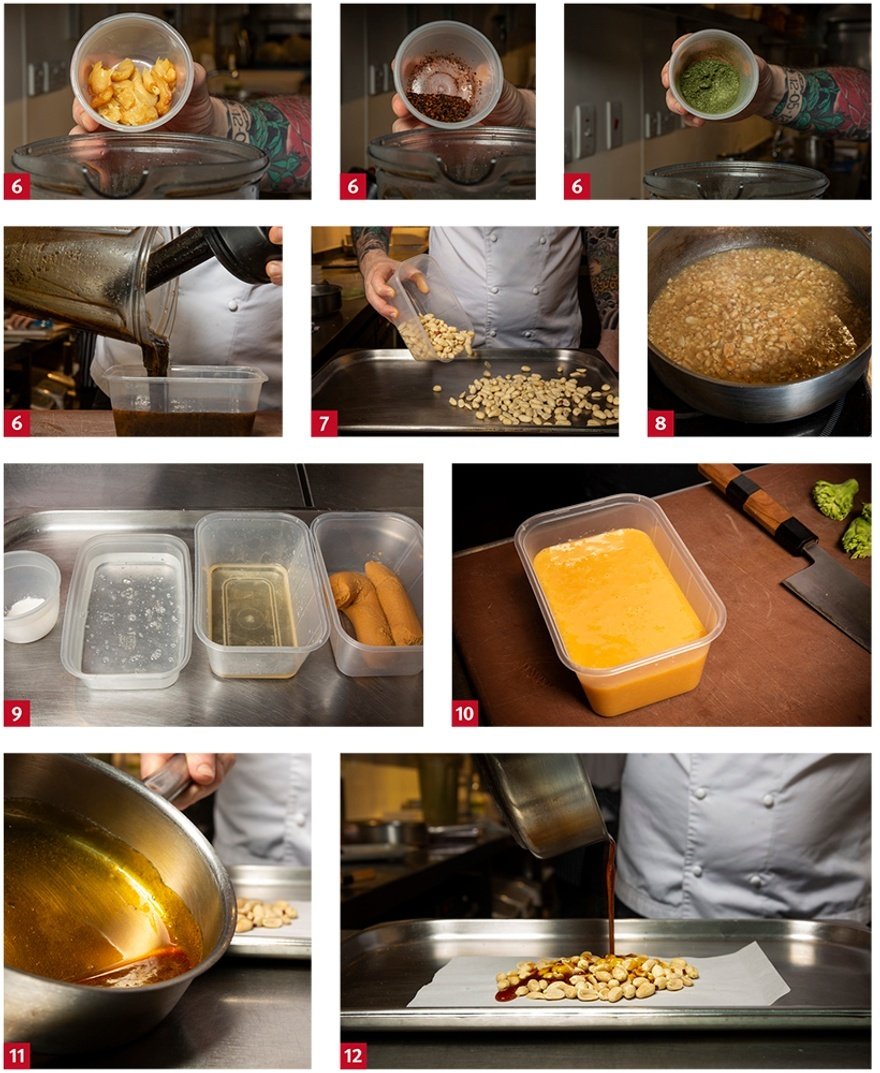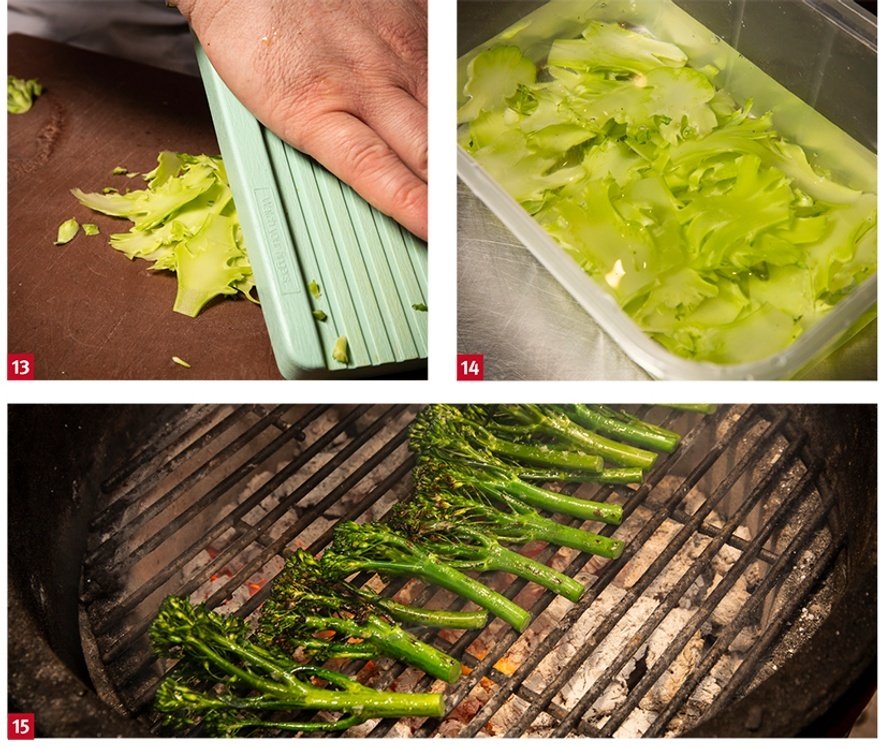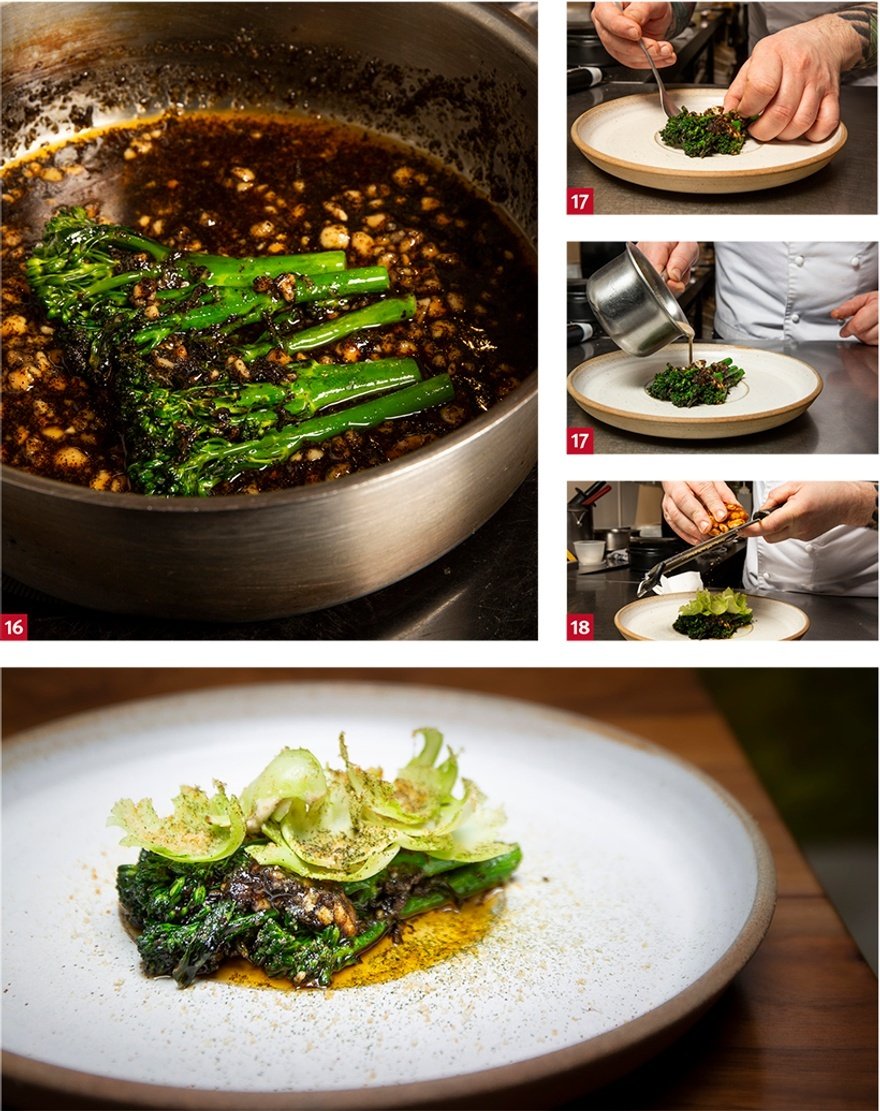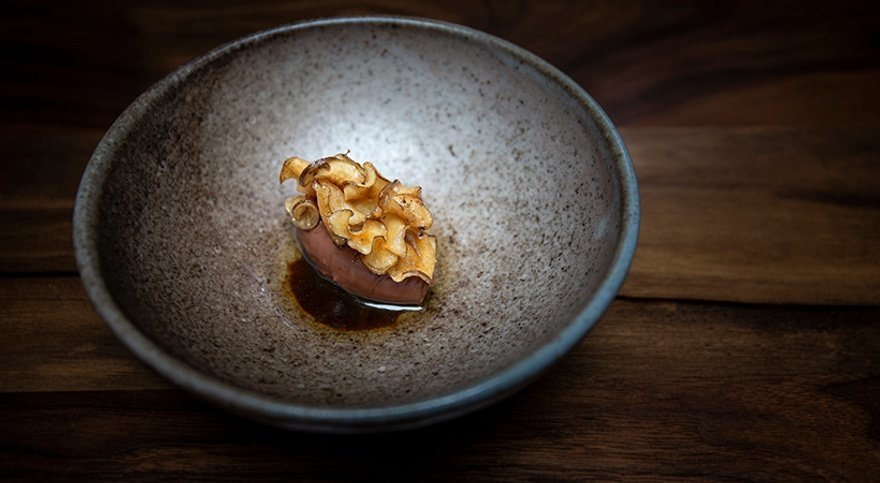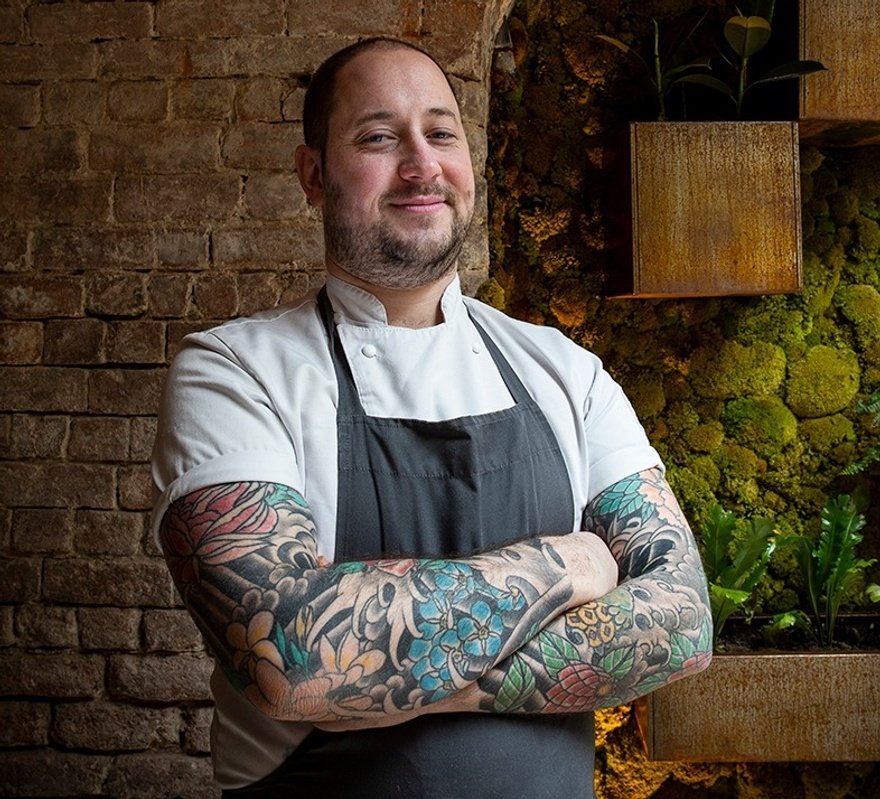Alex Bond's plant-based menu at Alchemilla in Nottingham puts the vegetables in the centre of the plate. Here, broccoli gets the star treatment. Michael Raffael reports
Over a decade ago, Alain Passard tried introducing a plant-inspired menu at his three-Michelin-starred Paris restaurant Arpège. He was ahead of his time. Chefs, schooled on the creed that fish or animal protein was the core of fine dining, are catching up on him fast.
The plant-based trend isn't inspired either by vegetarian or vegan dogma, it's more of an opportunity to apply the skills and tastes that have been simmering away in kitchens for the past two decades.
At Alchemilla in Nottingham, Alex Bond mixes ingredients, techniques and tastes from around the world. He colours his tenderstem broccoli with taste touches from Japan, South East Asia and Latin America.
But it isn't fusion cuisine, nor does he pretend it is. What matters more to him is that the main ingredient doesn't play a supporting role. After all the backroom work preparing the dish, he puts a recognisable plate of broccoli in front of the customer. "If it's on the tin," he says, "I want people to know it's there."
Planning
Alchemilla opens for lunch and dinner four days a week, Wednesday to Saturday. The kitchen relies on larger batches where practical, based around a weekly 300 covers. Mise en place for the broccoli lends itself to making larger quantities of the sauce, dressing and dusting. The broccoli is always chargrilled and finished to order.
- Satay sauce – made as a weekly batch
- Ancho dressing – made as a weekly batch
- Toasted peanut oil – made as a weekly batch
- White miso paste – made as a batch
- Peanut brittle powder – made as a batch
- Nori powder – made as a batch
- Micro-planed broccoli stems – 1-2 hours pre-service
- Broccoli stems – grilled and finished to order
Cost
Tenderstem broccoli costs about £5 per kilo. The dish is on all three tasting menus, which are priced at £65 for five courses, £80 for seven and £95 for 10.
Satay sauce
Note: The quantity prepared for photography is about 20% of the typical batch size.
- 30ml neutral oil
- 2 shallots, finely diced
- 5cm ginger, peeled and finely diced
- 2 cloves garlic
- 15g red chilli (mild to medium-hot)
- Salt
- 2 kaffir lime leaves
- 300ml thick coconut milk
- 75g oven-roasted peanuts
Heat the oil in a pan. Over a medium flame add the shallots, ginger, garlic, chillies and a little salt (1). Add the lime leaves and stew gently until the base has softened without colouring (2).
Pour in the coconut milk (3). Grind the roasted peanuts and add to the pan. Simmer until all the flavours balance out (4). Blend in a Vitaprep (5). Check the seasoning. The texture should be a light coating consistency.
Ancho dressing
Note: The quantity prepared for photography is about 10% of the typical batch size.
- 20g garlic cloves, in their skins
- 20g black garlic
- 12g ancho chillies
- 1tbs powdered nori
- 250ml neutral oil
Wrap the whole garlic cloves in foil and roast at 150°C until soft and sweet. Peel the skins and discard them. Put all the dry ingredients in a pan with the oil and steep for a few minutes over a low heat. Roughly blend and reserve (6).
Roasted peanut oil
Note: The quantity prepared for photography is about 10% of the typical batch size.
- 100g skinned raw peanuts
- 100ml neutral oil
- 50ml nam pla Thai fish sauce
Roast the peanuts for 10 minutes at 130°C (7). Chop them coarsely. Stew the peanuts gently in oil until they start to colour (8). Add the fish sauce and simmer for a few minutes longer.
Miso base
Note: The quantity prepared for photography is about 20% of the typical batch size.
- 200g white miso paste (from www.sushisushi.co.uk)
- 170g rice wine vinegar
- 0.1g xanthan gum
Combine the ingredients (9) and blend in the Vitaprep (10).
Peanut brittle powder
Note: The quantity prepared for photography is about 20% of the typical batch size.
Heat 200g granulated or caster sugar to a mid-amber caramel (11). Stir in 200g lightly roasted peanuts. Turn out onto a sheet of silicone paper or a silpat mat and cool (12).
Sliced and iced broccoli stems
For one service. Slice 250g broccoli stems with a microplane (13) and transfer to iced water (14). Leave for about two hours so that the slices curl.
Tenderstem broccoli satay
Serves 1
- 60g-70g tenderstem broccoli tops
- Neutral oil
- 20ml approx roasted peanut oil
- 30ml ancho dressing
- 1tsp miso base
- 20ml approx satay sauce at 62°C
- Curled broccoli stems
- Peanut brittle dusting
- Powdered nori dusting
Brush the broccoli with a minimum amount of oil to prevent sticking. Chargrill in a Big Green Egg or on a similar grill (15). It shouldn't colour or cook through, but take on a pleasant smokiness.
Warm through the roasted peanut oil, ancho dressing and miso base in a pan. Add the broccoli, turning it well so it takes on the flavours and finishes cooking (2-3 minutes) (16). Drain on absorbent paper to remove excess oil, leaving some nuts stuck to it.
Arrange the broccoli on the plate and spoon the satay sauce beside it (17). Arrange the iced broccoli stems on top. Grate the peanut brittle over the broccoli and dust with the nori powder (18).
Chocolate, Jerusalem artichoke
Bond likes to slip vegetables into the desserts on his plant-based menu, such as his chocolate ganache quenelle with Jerusalem artichoke crisps.
He makes an unsweetened crème anglaise with 500ml whole milk, 500ml double cream and 200g egg yolk. In it he dissolves 600g single estate Madagascan 75% chocolate, which has an intense, fruity flavour. Left to set, it forms a ganache-like texture.
Separately, he fries Jerusalem artichoke crisps in oil at 150°C. He prepares a roasted Jerusalem artichoke broth as follows: deglaze roasted artichoke with water, infuse some of the fried crisps, strain, and add a touch of viscosity with 0.09g xanthan gum. Reserve the rest of the fried crisps for topping the dessert.
He serves a quenelle of chocolate with a tablespoon of the broth, a tablespoon of coffee oil and crisps tossed in salt and icing sugar.
Alex Bond
Alex Bond does his own thing. Soundbite labels, such as modern British, plant-based or neo-fusion, don't capture his cooking style. If he were French he might label it "cuisine d'auteur", but that's too pretentious for the blunt Yorkshire chef.
‘Puzzle solver' might appeal more to him. Converting an ingredient with limited potential into something special motivates him.
"Hand-dived scallops are amazing," he said, "but the workhas already been done for you. Taking a cabbage and turning it into something delicious is a challenge."
This doesn't, in his case, mean transforming it. He doesn't subscribe to the molecular gastronomy club, and 95% of the produce he buys (meat, seafood, vegetables, fruit) is UK-sourced. The puzzle element starts with the other 5%.
Here, he described himself as a "magpie". "Being British doesn't stop us taking things from other cultures. It might be a Thai curry, or lactic fermentation, anything that gives us more options. We try and create an amazing menu, regardless of how we get there."
The emphasis on vegetable dishes sits comfortably with his character. In part, it's a reaction to growing up in a traditional meat and two veg household, but it owes more to his own family life.
His wife studied horticulture at the University of Nottingham and he has always cultivated an allotment.
"I had what alcoholics call a moment of clarity. Me and my wife decided we would stop eating meat unless we were sure about where it came from."
The decision taken, he realised that things they prepared at home had potential, with work, to become restaurant dishes.
Since he opened Alchemilla in 2017, his innovative menus have always emphasised plants. On the plate, they aren't accessories or garnishes; he treats them exactly as chefs might handle a fillet steak or a lobster. "We cook every vegetable fresh, for every service. We don't salt-bake 50 celeriac at the start of the week and keep them in the fridge for later.
"If a chef peels something wrong or cooks something wrong, it's disrespectful to the person who grew it, nurtured and harvested it. When I see somebody carelessly peeling with a knife and throwing half the vegetable in the bin, that makes me angry."
Over a decade ago, he spent three years as a chef de partie, working for Sat Bains, and the experience left its mark. Since then, he's worked for Phil Thompson at Auberge du Lac in Welwyn, Hertfordshire; Turners at 69 in Birmingham; and the Wild Rabbit in Kingham, Oxfordshire.
As a member of someone else's brigade, he'd accepted that decisions about how or what to cook weren't his: "You get to the point where you want to do something, but the chef won't let you or it doesn't fit with the restaurant. You yearn to have freedom."
Being in his own place had its own constraints, but empowered him: "Chefs crave stimulation. They have to apply common sense, but they need to think laterally and get their creative mind working."
Continue reading
You need to be a premium member to view this. Subscribe from just 99p per week.
Already subscribed? Log In


